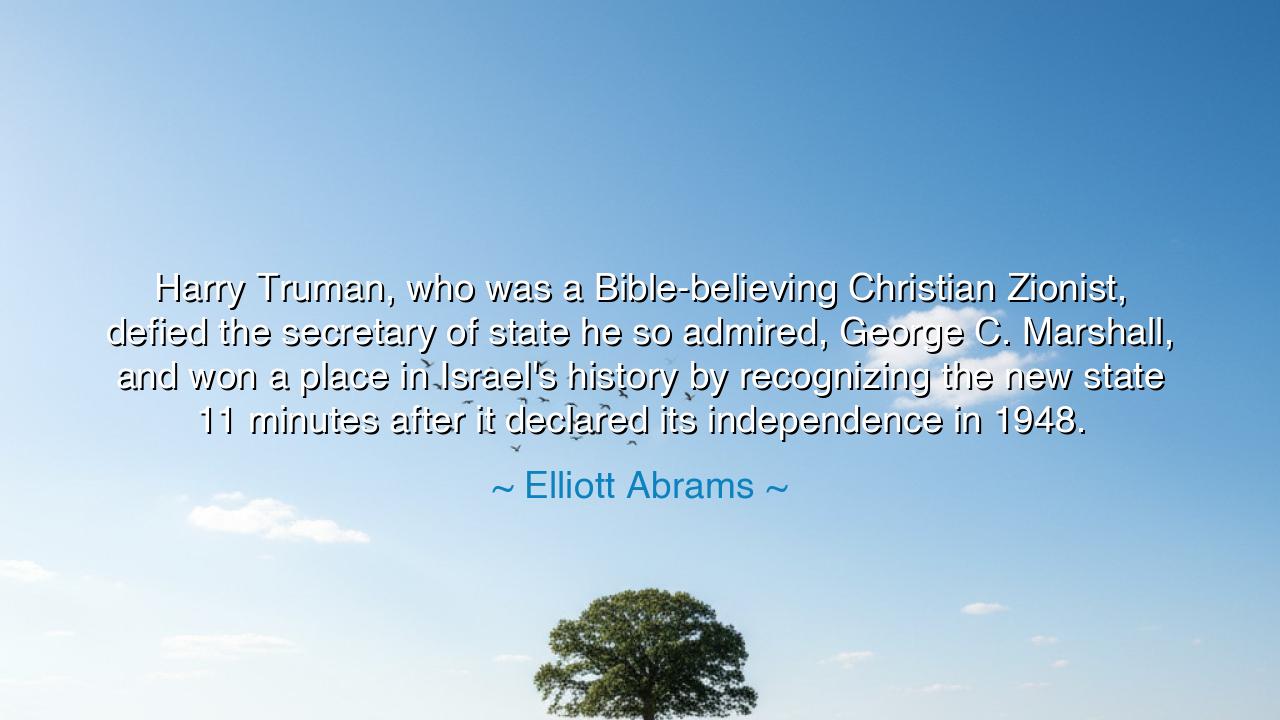
Harry Truman, who was a Bible-believing Christian Zionist, defied
Harry Truman, who was a Bible-believing Christian Zionist, defied the secretary of state he so admired, George C. Marshall, and won a place in Israel's history by recognizing the new state 11 minutes after it declared its independence in 1948.






"Harry Truman, who was a Bible-believing Christian Zionist, defied the secretary of state he so admired, George C. Marshall, and won a place in Israel's history by recognizing the new state 11 minutes after it declared its independence in 1948." – Elliott Abrams
Hear, O seekers of wisdom and courage, the words of Elliott Abrams, who recalls one of the great turning points of the modern age — the moment when Harry S. Truman, President of the United States, chose conviction over caution, faith over fear, and the moral call of destiny over the counsel of worldly prudence. His act, though it took but 11 minutes, would echo across centuries, shaping the fate of nations and reaffirming the power of conscience in the face of doubt.
The meaning of this quote lies in the nature of moral defiance — that sacred moment when one must choose between the safe path and the right one. Truman, though a man of politics, acted here as a man of faith. When the Jewish people declared independence in their ancient homeland on May 14, 1948, the world stood divided. Many great powers hesitated, fearing turmoil, war, and the wrath of adversaries. Even his own Secretary of State, George C. Marshall, a man Truman revered, urged him to stay his hand, to delay, to think first of political consequence. Yet Truman’s heart was stirred by something greater — by Scripture, by history, by the ancient bond between the Jewish people and the land of Israel.
The origin of this moment lies in the ashes of the Holocaust and the long yearning of a people for restoration. For nearly two thousand years, the Jewish nation had wandered without a home, their sovereignty extinguished by empires, their people scattered to the winds. And now, after surviving the darkest night in human history, they sought once more to stand free upon their own soil. The world watched — and hesitated. But Truman, guided by what he called “human sympathy and divine justice,” stepped forward. With a single decision — to recognize the State of Israel mere minutes after its birth — he gave legitimacy to a dream reborn, and offered hope to a people who had endured centuries of exile.
Yet Abrams reminds us that this decision was not made lightly. Truman stood against powerful opposition. George Marshall, the architect of postwar recovery and one of the most respected men in America, warned that recognition could lead to chaos in the Middle East and threaten America’s standing. For Truman to defy him required immense courage. It was a clash not between good and evil, but between prudence and principle, between the mind of statecraft and the heart of faith. And in that clash, Truman chose conscience. He said later, “I had faith in the righteousness of Israel’s cause.” That faith, born of both Scripture and moral intuition, became his compass — and through it, he inscribed his name upon the story of Israel’s independence.
History offers few acts so swift and yet so enduring. In 11 minutes, Truman became the first world leader to acknowledge the rebirth of the Jewish state — an act of recognition that transformed political maps and spiritual destinies. It was the closing of one chapter and the opening of another: from dispersion to return, from despair to renewal. In this moment, Abrams sees not just political decision, but divine alignment — the intersection of prophecy and courage, of human will and eternal promise.
From this act arises a lesson for all generations: that leadership is not the art of appeasement, but the strength to stand alone when conviction demands it. Truman’s defiance reminds us that the counsel of wisdom is not always found in consensus. There come moments when one must choose to act not because the world agrees, but because the soul commands it. True independence, whether of a nation or a person, is born in such choices — when one listens to conscience above fear, and principle above politics.
So let all who hear remember this truth: a single act of courage can alter the course of nations. In the recognition of Israel, Truman did not merely sign a document; he affirmed the endurance of faith over centuries of exile and suffering. As Abrams teaches through his remembrance, the light of freedom is kindled not by those who calculate safety, but by those who act upon conviction. Therefore, in the battles of your own life — when the world says “wait” and your heart says “now” — remember Truman’s example. Stand for what is right, though you stand alone. For the measure of a life, like that of a nation, is not in the length of its peace, but in the courage of its choices.






AAdministratorAdministrator
Welcome, honored guests. Please leave a comment, we will respond soon